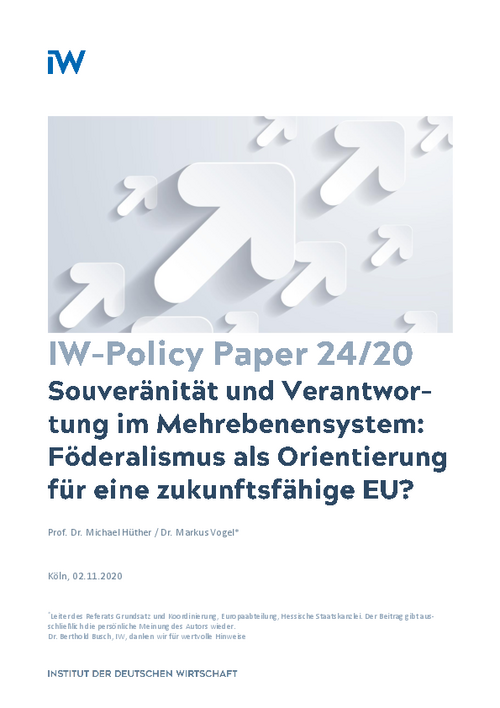At the beginning of the year 2020 the European Union stands just ahead the new institutional cycle. The results of the elections to the European Parliament have not fulfilled the fears about Euroscepticism characterizing the following period.

Sovereignty and Responsibility in a Multi-Level System: Federalism as an Orientation for a Sustainable EU?
IW Policy Paper

At the beginning of the year 2020 the European Union stands just ahead the new institutional cycle. The results of the elections to the European Parliament have not fulfilled the fears about Euroscepticism characterizing the following period.
However, the growing differentiation of European policy perspectives in the member states suggests that a simple „keep it up“ will not be the solution such as that the next steps of integration have deliver concrete responses on the citizens‘ needs. A new debate on the future of the European Union has started, yet: an interinstitutional conference on the future of the EU was foreseen to be inaugurated on Europe Day on 9th May 2020, but due to the Covid 19 pandemic the conference is postponed. In the public and political debate in Germany, the principle of subsidiarity (art. 5(3) TEU) plays a major role for the presumption of competences in the European multilevel system.
The view on the juridical as well as on the economical debate on the principle of subsidiarity as a regulative for the competence order and the allocation efficiency remains somewhat unsatisfactory and the dilatory view on the federal elements of the EU does not help at first, too. In these multilevel systems, there collide historically diverging, systematically inconsistent as well as qualitatively different needs having to be brought in a balance. This results in the promotion for an „active subsidiarity“ as well as a „subsidiarity routine“ in order to shape that together dynamically in the heterogeneous EU multilevel system – with its differentiated national state regulations as well as the different references in territorial terms. So it can succeed to find balance between the needs of the citizens (acceptancy), the EU institutions (efficiency) as well as of those of the different levels of decision making and acting (reason for being). Above all, however, subsidiarity has to start at home, i.e. it can just be strengthened in the EU as long as it does not erode in the member states. There is a challenge often that has often been neglected so far.

Prof. Dr. Michael Hüther / Dr. Markus Vogel: Souveränität und Verantwortung im Mehrebenensystem – Föderalismus als Orientierung für eine zukunftsfähige EU?
IW Policy Paper

More on the topic
![[Translate to English:] Das Gebäude des Weißen Hauses in Washington, D.C. in den Vereinigten Staaten von Amerika. [Translate to English:] Das Gebäude des Weißen Hauses in Washington, D.C. in den Vereinigten Staaten von Amerika.](/fileadmin/_processed_/c/1/csm_GettyImages-2161499385_White_House_Editorial_884306add8.jpg)
Trump or Harris or ...? What Europe must prepare for
A few months before the presidential election in the USA, Donald Trump has a good chance of being re-elected. On the Democratic side, the incumbent president has withdrawn his candidacy after a long period of hesitation, while Vice President Kamala Harris is ...
IW
Compendium 5.5: CO2 Regulation of Road Transport in Europe
With the Compendium CO2 Regulation in Europe, the IW has been providing the interested public with a comprehensive collection of data on the development of CO2 emissions from passenger car traffic in the European Union, as well as on the applicable regulatory ...
IW